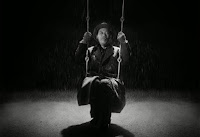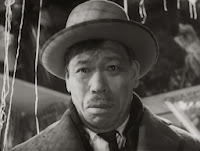The answer: a lot. The same rule that has applies to my stories has applied to literally every story that has ever been told throughout time, save perhaps for the first story that was ever told. Arguably some of the greatest works of literature throughout history have merely been adaptions of something that came before. Virtually none of Shakespeare's content was original. His works had all been previously told, he just added his own personal spin to each story. For example, The Tragedy of Othello, The Moor of Venice, was based upon two books, "Hecatommithi" by Cinthio and "A Geographical History of Africa" by Leo Africanus.
His content wasn't his own, but we still laud him for his mastery of the written and spoken word over 400 years later. Inversely, Othello has lead to an innumerable number of modern adaptions. There have been many theatre adaptions, such as "Desdemona, a play about a handkerchief" by Paula Vogel. This modern adaption tells the same story, but this time from Desdemona's point of view. All the events of the "original" still occur, but you get the "meanwhile" action. Is it the same story? Yes. Does it still have merits for the way the story is spun? Absolutely. Othello has led to other liberal adaptions, such as 2001's movie "O", where it's practically the same story, only in a high school setting. In the original, Iago may warn Othello "O, beware, my lord, of jealousy! That is the green eyed monster which doth mock the meat it feeds on". In "O" the Iago character says " Watch your girl, bro".
.jpg) |
| "Watcheth your wench, bretheren" |
Perhaps that is the beauty of it all. True creativity stems from taking an existing piece of work an morphing into something fresh and your own. As seen in the "Everything is a Remix" video by Kirby Ferguson, some of the best movies of the 20th and 21st centuries have literally taken and copied scenes shot for shot and adapted them into their movies. Films such as "Star Wars" and "Kill Bill" all have adapted scenes from previous movies. Their stories too are adaptions on previous ones. Still, we still give them credit for being great movies.
Today, arguably some of the best creative pieces are adaptions. One of my favorite films of all time is called "Ikuru" (1952), co-written and directed by Akira Kurosawa. It follows a minor Tokyo bureaucrat, who is dying of stomach cancer and struggling to find meaning in his life. "Ikiru" although arguably one of Kurosawa's lesser-known pieces, has influenced arguably the hottest show on television right now, "Breaking Bad".
Recently, Vince Gilligan, the creator of "Breaking Bad" was on NPR's Fresh Air, had a few things to say about Wantanbe-San, the main character of "Ikiru", and Walter White.
There’s a wonderful Kurosawa movie from the 50s in which a man, a mid-level, very much a Walter White-type, or rather, Walter White, I suppose, inspired by this man. This man is very much a mid-level corporate guy who finds out he’s dying of cancer. And in the last months of his life what he chooses to do is a very good thing, it’s to build is playground, a small playground in Tokyo for the children in his neighborhood.
And this haunting ending of this movie is this man swinging on a swing set in this playground that he’s managed to build after a surprisingly hard go of it. And the snow is coming down and he singing a Japanese children’s song, and it’s just haunting and beautiful. And, of course, Breaking Bad is anything but that. It’s the flip side of that. It’s a man doing terrible things once he is freed by this knowledge that he does not have long for this world.
But I think what the two stories to share in a sense is the idea that if we found out the exact expiration date on our lives if we found out when we were going to be checking out, would that free us up to do bold and courageous things, either good or bad things, hopefully good things, then I think there’s a lot of that involved in Breaking Bad.”
If you had to boil each of these pieces of media into a log line, they would both be extremely similar. "Dying man struggles to make something of himself in his last days". It's the same story, just taken in two beautifully different directions. One focuses on a man trying to build a playground, and the other focuses on a man cooking meth. Both great. The story is only one part of the overall piece, and ultimately the sum is greater than it's parts.
To push an argument further, "Ikiru" was in fact inspired by a Leo Tolstoy short-story titled "The Death of Ivan Ilyich".
Everything is built off of something else. Once I realized, I became confident in my "unoriginality" and now can take little bits of things and fashion them into a "script collage" all of my own.





No comments:
Post a Comment